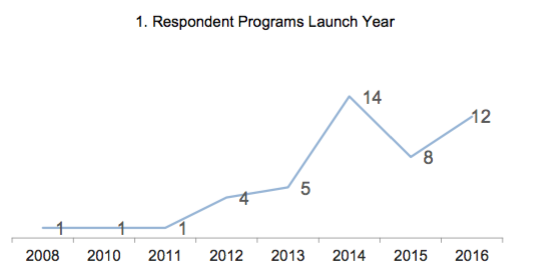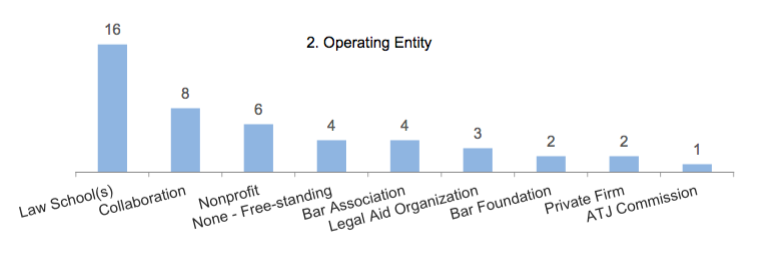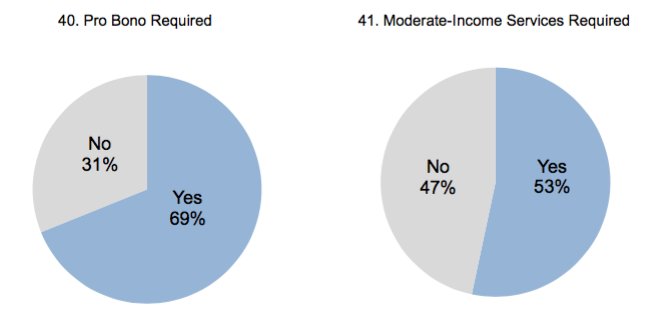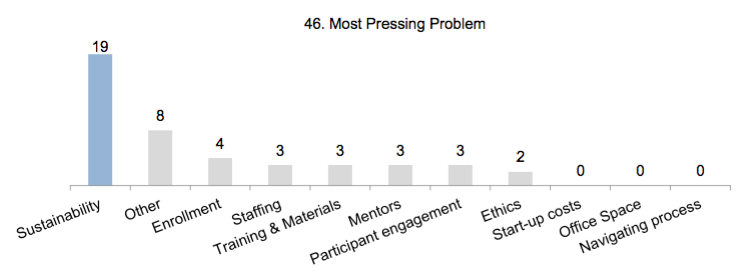Last month, the ABA issued its first ever report on “lawyer incubators.” What is a lawyer incubator you ask?
Lawyer incubators have emerged as models that enable newly-admitted lawyers to acquire the range of skills necessary to launch successful practices that expand access to legal services for those of low and moderate incomes. The alpha incubator was established at the City University of New York in 2007. Today, there are over 60 incubators nationwide. Click on the appropriate image below to access a directory of current and planned incubators, profiles of the programs and latest developments and resources.
Lawyer incubators are essentially business/start-up incubators, but with a focus on helping new lawyers get their practices off the ground instead of starting a business.
The survey had a number of high level findings that I want to examine below. The findings will go first in italics, my commentary will follow.
There has been a recent growth of incubators
- Although the first incubator emerged in 2007, three fourths of the programs that responded to the Survey have been created since 2014. Some of the programs included here have very recently “graduated” their first class of incubator participants and a few have not even reached that point. Consequently, some of the metrics included in the survey are very preliminary.
- New thing that has never been done before, is new. News at 11. Beyond that, it’s telling that incubators continue to spring up in wake of the malaise surrounding the legal industry. Despite lower enrollment in law schools, jobs don’t seem to be coming back. As a result, many people who are graduating from law school are hanging their shingle, whether they want to or not. Incubator growth should (in theory) help provide support and guidance during this process.
The nature, structure and design of incubators varies greatly from one program to another
- The Survey demonstrates that the development of incubators has been organic. These is no template for their design and operations. While many are sponsored by law schools, several are collaborative efforts and some are sponsored by other entities, such as bar associations and foundations, legal aid programs, law firms and non-profit organizations. The services offered by incubators, the funding sources and the range of legal services provided by the participating lawyers to their clients all vary considerably from one program to another.
- Blind leading the blind up in here. Given how new these programs are, there hasn’t been time to develop best practices, templates, or model procedures/systems. Everyone is making it up as they go along.
Incubators are aggressively advancing social responsibility through pro bono services and orientations to low and moderate income populations
- The common denominator running through most incubators is their dual mission to prepare recently-admitted lawyers to develop and launch new practices while at the same time providing services to underserved populations. Pro bono is a fixture in seven out of every ten programs.
- A laudable goal, but I’m not sure if it should be a required one. Yes, there is an access to justice gap in this country. But!
- Clients need competent legal representation, not just a warm body fresh from law school. There needs to be safeguards in place to ensure that some pup lawyer doesn’t get handed a capital murder case.
- Lawyers aren’t priests. No one takes a vow of poverty when they leave law school (though they should considering the amount of debt they undertake). Business/startup incubators are about helping new companies get their feet under them so they can become dynamos, not to barely scrape by. I’m not persuaded that legal incubators should be any different.
Incubators are providing their participating lawyers with an array of educational and practice management tools
- In-kind support from legal service vendors enable incubator participants to test-drive a wide variety of resources designed to support their practices, create efficiencies and enable the delivery of services at lower costs.
- Legal service vendors seem to be offering their wares for free to these incubators. Bravo. Sure, participants in these incubators will likely become future customers, but the service vendors should still be commended for offering their valuable services for free to incubators.
Innovation is stressed in many programs but has room to grow in others
- Several of the programs are introducing concepts such as unbundled legal services, niche markets and alternative billing structures, but some focus on more traditional practice methods. This points to an opportunity for the larger community of incubator programs to draw from the resources of one another and suggests that some level of peer-to-peer technical assistance can expand an environment of experimentation.
- Again, I’m leary at the prospect of experimentation if it results in a detriment to clients. Experimentation with billing, practice management, workflow systems, etc = good. Experimentation with anything regarding client outcomes = bad.
The short-term metrics of incubators are very preliminary and do not measure the long-term potential of the programs on both assistance to recently-admitted lawyers and those in need of affordable legal services
- Data regarding the impact incubators have had on client communities are valuable for baseline comparisons, but too preliminary to serve as meaningful metrics of these programs. The impact of incubators are intended to be long-term, creating a cadre of lawyers that have careers with sustainable practices that meet the legal needs of underserved communities and clients over the span of decades.
- Again, this is so new, all we know is: ¯\_(ツ)_/¯
The overwhelming concern of those operating incubators is their sustainability
- While many programs are operating on shoe-string budgets, others, particularly those with substantive staff, are often costly. Seemly the sustainability of incubators depends on the identification of stable and on-going sources of support.
- How long will the gravy train last? These incubator can only exist at the behest, and generous financial donations, of their supporters. If the incubators don’t develop self-sustaining trusts of their own, can they continue? Are they a flash in the pan or the start of something that will soon be commonplace? At the moment, it’s too soon to tell.
You can download and read the whole report here (48 pages, PDF). If you’ve been through a lawyer incubator, or know someone who has, I’d be interested to hear about their experience.
[divider]
You know what else has reviews? My book. You can read some here.



















